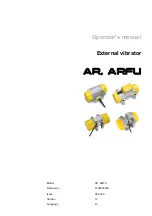
4
V. Principles of Operation
If ambient air cannot be utilized directly as a cooling medium, another cost-effective
method of cooling is a Water-to-Air system (below). Water is used to remove heat from
the air circulated within the electronics enclosure.
Cooling water is circulated through a tube-and-fin coil. As the heat-laden air circulates
through the coil, the heat is absorbed by the water and carried away, in a continuous
process.
Water-to-Air systems are easy to install and usually require minimum maintenance.
The water used must be reasonably clean and cold enough to ensure proper
operation of the cooling system under the most severe anticipated conditions. In some
cases, if sufficiently cold water is available, below-ambient-temperature cooling can be
achieved.
The Heat Exchanger with options -- Automatic Water Flow Control and Heater is
shown on Figure 2.
Heated Air
Blower
Water
with
Heat Load
Cold
Water
Heat
Exchanger
Cabinet
Cooled Air
WATER-TO-AIR
A Water-to-Air Heat Exchanger works by transferring heat of internal
air to circulating water, resulting in chilled air which is recirculated
throughout the electronics or electrical cabinet.
The Adjustable Water Control Thermostat opens and closes a water solenoid
valve based on the set point and differential settings. A temperature sensor is
located in the airstream of the cabinet. The Adjustable Water Control
Thermostat has a factory set point of 75
°
F.
In winter, if the cabinet temperature is below 75
°
F, the water solenoid
valve is closed. The heater thermostat keeps the cabinet temperature
between 40 and 60
°
F by turning the heater off and on. The limiter thermostat
has a set point of 180
°
F.
Limiter
Thermostat
Heater
Thermostat
Heater
Blower
Water Control
Thermostat
Solenoid Valve
Figure 2
Figure 1


























